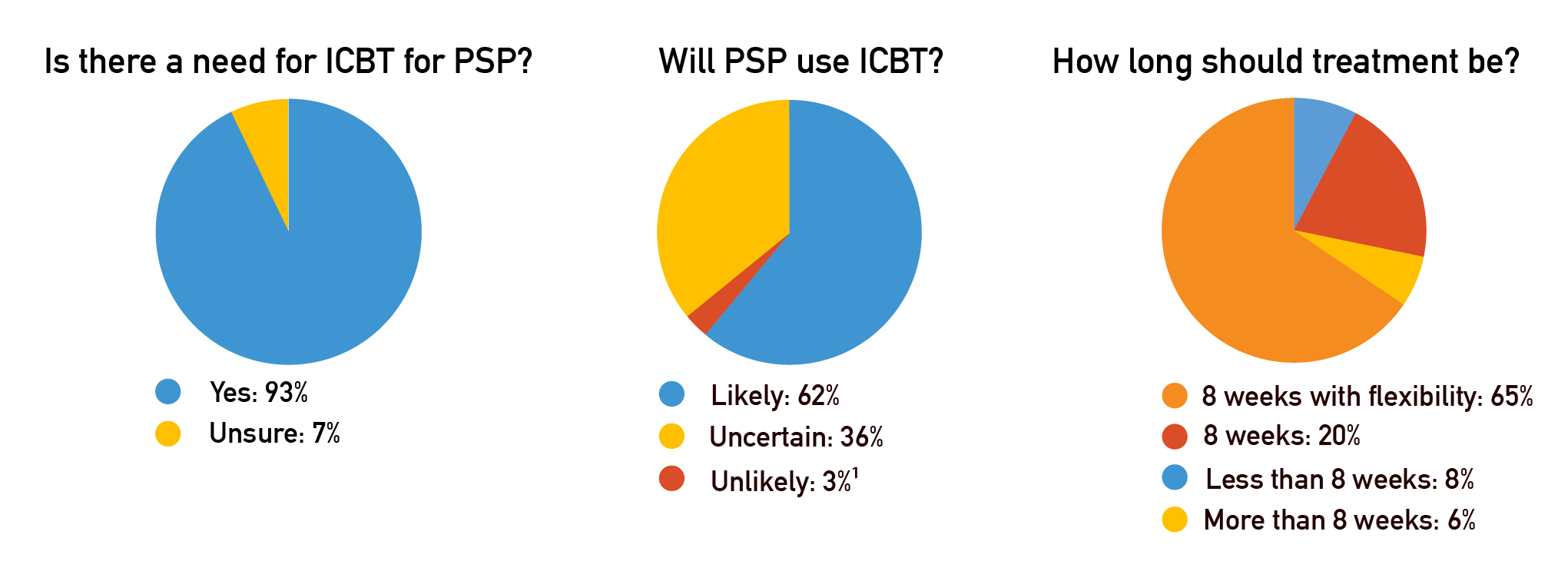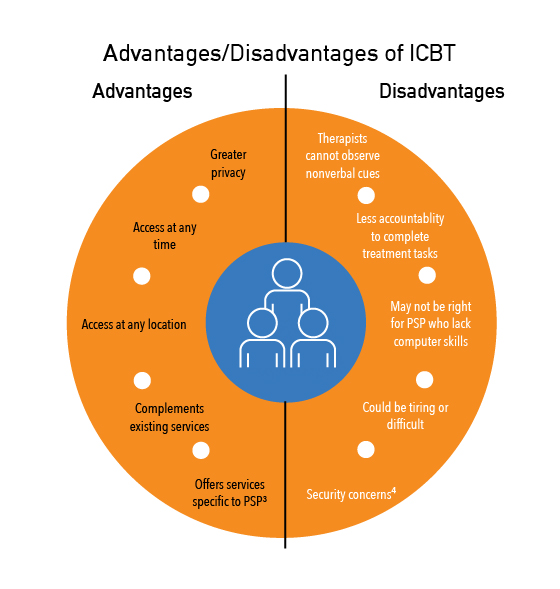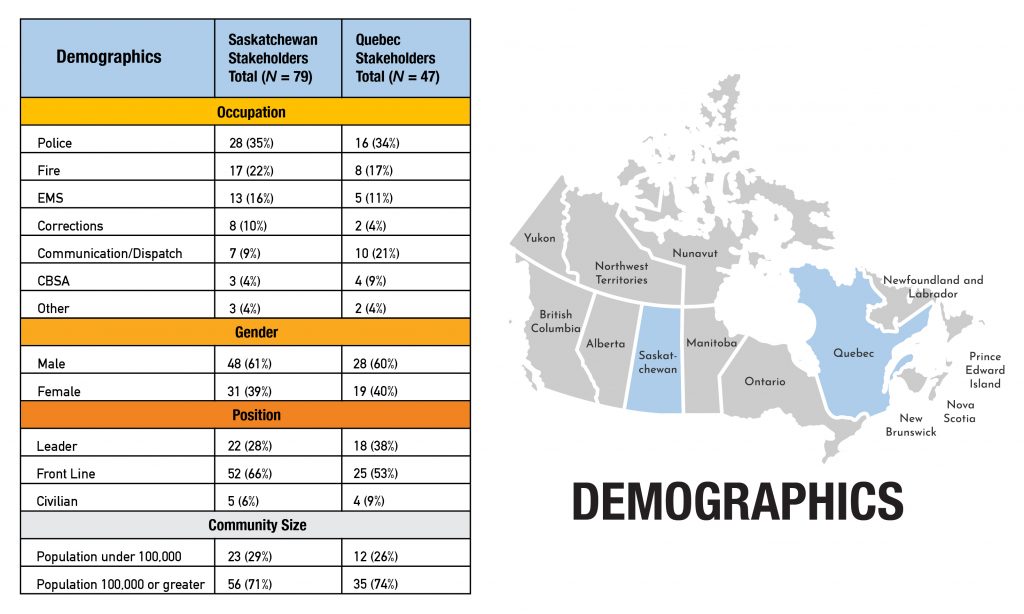Optimization of internet-delivered cognitive behavioural therapy for Canadian leaders within public safety: Qualitative study
Authors: Price, J.A.B., McCall, H.C., Demyen, S.A., Spencer, S.M., Katz, B.M.W., Clairmont, A.P., & Hadjistavropoulos H.D. (2025)
Topics: Anger, Anxiety, Depression, ICBT, Posttraumatic Stress, Public Safety Leaders, Therapist-Guided
PSP
Outcomes of internet-delivered cognitive behavioural therapy tailored for Canadian public safety personnel among Indigenous and White clients
Authors: Price, J.A.B., McCall, H.C., Jenna, I., McGinnis, A., McKenna, E.B., & Hadjistavropoulos H.D. (2025)
Topics: Anger, Anxiety, Depression, ICBT, Indigenous, Posttraumatic Stress, Therapist-Guided
PSP
Examining how organizational leaders perceive ICBT for PSP using the RE-AIM implementation framework
Authors: Beahm, J., McCall, H., Carleton, R. N., Jones, N., Hadjistavropoulos, H. 2024.
Topics: Public Safety Leaders, Therapist-Guided
PSP
Web-based mindfulness meditation as an adjunct to ICBT for PSP: Mixed methods feasibility evaluation study
Authors: Landry, C. A., McCall, H. C., Beahm, J. D., Titov, N., Dear, B., Carleton, N. R., & Hadjistavropoulos, H. D. 2024.
Topics: Anger, Anxiety, Depression, Mindfulness, Posttraumatic Stress, Resilience, Sleep, Therapist-Guided
PSP
Why was the study done?
Public Safety Personnel (PSP) are at a high risk of developing mental disorders and face unique barrier to traditional mental health treatments. The PSP Wellbeing Course is an 8-week internet-delivered cognitive behavioral therapy (ICBT) course tailored to assist PSP with symptoms of depression, anxiety, and posttraumatic stress disorder (PTSD). The course has demonstrated success in reducing the impact of mental disorder symptoms, but some clients have reported challenges with learning skills and recommended adding more resources.
What was done in the study?
Mindfulness meditations were added to the course as a complementary resource. Mindfulness meditations help people to experience the world and their reactions to the world in open and nonjudgmental ways. The study was designed to evaluate whether a sample of 40 PSP liked the mindfulness meditations, engaged in the mindfulness meditations, and found the mindfulness meditations to be helpful. We also evaluated whether the use of mindfulness meditations was associated with changes in symptoms.
We added 5 mindfulness meditations to the pre-existing PSP Wellbeing Course. Once clients completed the course, we administered questionnaires and invited them to participate in interviews to learn about their experiences with the course.
What did we find out?
Course findings
- Of the 40 clients who enrolled in the course, 68% reported using the mindfulness meditations.
- Clients who completed the course experienced improvements in self-reported symptoms of anxiety, depression, PTSD, and anger. They also reported improvements in resilience and mindfulness.
- Of the clients who used the mindfulness meditations, 93% said they would recommend them to a friend and 89% said that the mindfulness meditations were worth their time.
What did participants like?
- Participants reported mindfulness meditations:
- Were beneficial
- Helped reduce stress and improve relaxation
- Helped them slow down and regulate their bodies and emotions
What did participants not like?
- Participants reported certain challenges with the mindfulness meditations, including:
- Feeling uncomfortable sitting with their feelings and emotions
- Difficulty finding time, motivation, and quiet space
- Technical issues
What suggestions for improvement were made?
- Providing shorter mindfulness meditations
- Providing videos with the mindfulness meditations
- Providing distinct endpoints at the end of the mindfulness meditations (e.g., a bell chime to indicate when the meditation ends)
Where do we go from here?
- This study builds on prior evidence that ICBT is an effective, acceptable, accessible, and useful treatment for PSP
- This study demonstrates that mindfulness meditations may be a useful addition to ICBT for PSP who are open to practicing mindfulness meditation
Original Story
Web-Based Mindfulness Meditation as an Adjunct to Internet-Delivered Cognitive Behavioral Therapy for Public Safety Personnel: Mixed Methods Feasibility Evaluation Study. Read Publication here.
ICBT for symptoms of PTSD among PSP: Initial outcomes of an open cohort preference trial of transdiagnostic and disorder-specific therapy
Authors: McCall, H., Dear, B. F., Landry, C., Beahm, J. D., Gregory, J., Titov, N., Carleton, R., N., & Hadjistavropoulos, H. D. 2023.
Topics: Anger, Anxiety, Depression, Posttraumatic Stress, Therapist-Guided
PSP
Why was the study done?
Public safety personnel (PSP) face high rates of mental health problems including, but not limited to, posttraumatic stress disorder (PTSD). Internet-delivered cognitive behavioural therapy (ICBT) shows promising outcomes for improving PSP mental health, but previous research has not yet evaluated PTSD-specific ICBT among Canadian PSP. There was also a need for research comparing PTSD-specific ICBT with ICBT designed to treat symptoms of multiple mental health concerns (known as transdiagnostic ICBT).
What was done in the study?
This study was designed to evaluate two ICBT programs tailored for PSP and offered via PSPNET—the PSP Wellbeing Course and the PSP PTSD Course—among 150 Canadian PSP who reported clinically significant symptoms of PTSD.
Content in the PSP Wellbeing Course focused on symptoms of depression, anxiety, and PTSD, while content in the PSP PTSD Course focused specifically on symptoms of PTSD. Both courses are 8 weeks long and included five lessons with weekly questionnaires, homework assignments, downloadable resources, and illustrative course vignettes. Optional therapist guidance by phone or secure email was also available up to twice a week for up 16 weeks. PSP were free to choose either course.
What did we find out?
Course preference:
- Approximately half the sample selected the PSP Wellbeing Course (57%), and approximately half selected the PSP PTSD Course (43%)
- PSP were more likely to enroll in the PSP Wellbeing Course if they had greater symptoms of depression
Course experience:
- PSP in both courses reported similar and favourable treatment satisfaction (e.g., 98% would recommend the course to a friend), treatment engagement (i.e., 69% access at least four of the five lessons), and feedback
Course effectiveness:
- The PSP Wellbeing Course resulted in greater reductions in panic disorder symptoms than the PSP PTSD Course
- PSP in both courses reported large reductions in depression, generalized anxiety, and PTSD
- PSP in both courses reported moderate reductions in anger
- PSP in both courses reported small reductions in social anxiety
Overall:
- The PSP Wellbeing Course and the PSP PTSD Course showed relatively similar outcomes
- This study builds on growing evidence that transdiagnostic ICBT (e.g., PSP Wellbeing Course) is at least as effective as disorder-specific ICBT (e.g., PSP PTSD Couse) for treating symptoms of various emotional disorders
Where do we go from here?
- This study builds on prior evidence that ICBT is an effective, acceptable, accessible, and useful treatment for PSP
- Future research should identify if and when disorder-specific ICBT is preferable to transdiagnostic ICBT
Original Story
Internet-delivered cognitive behavioural therapy for symptoms of PTSD among public safety personnel: Initial outcomes of an open cohort preference trial of transdiagnostic and disorder-specific therapy. Read publication here.
Sustaining and expanding ICBT for PSP across Canada: A survey of stakeholder perspectives
Authors: Landry, C.A., Beahm, J.D., McCall, H.C., Hadjistavropoulos, H.D. 2023.
Topics: Interested Parties, Therapist-Guided
PSP
Why Was the Study Done?
Public Safety Personnel (PSP) have an elevated risk of developing mental health problems and face barriers to accessing mental health treatments.
This study investigated:
- How PSP across Canada perceive internet-delivered cognitive behaviour therapy (ICBT) tailored to meet their needs.
- The level of organizational support for tailored ICBT within PSP organizations.
- Perceived facilitators and barriers to funding tailored ICBT.
The overarching purpose of the study was to develop strategies to provide ICBT to a greater number of PSP.
What was Done in the Study?
524 PSP across Canada participated in an online survey. They were asked to view a short video and brochure about PSPNET. Then, they answered questions about the advantages and disadvantages of tailored ICBT and factors that could help or hinder the implementation of PSPNET. 262 participants who self-identified as leaders were asked some additional questions about their perceptions of PSPNET. The survey was completed between November 2021 and March 2022.
What Did We Find Out?
- 72% of participants indicated that they had not heard about PSPNET before the survey, and 97% reported never having used PSPNET or any other form of online therapy.
- On average, PSP agreed or strongly agreed that mental health problems are common within their occupations and that PSPNET should be easily and freely accessible to them.
- PSP identified the following characteristics as PSPNET’s greatest advantages:
- Accessibility at any time and location
- Minimal wait time
- Free service
- Therapist guidance for 16 weeks
- When asked about potential disadvantages of PSPNET, PSP identified the following as mild concerns about PSPNET:
- Absence of face-to-face interaction
- ICBT may require more motivation than face-to-face therapy
- Reading material could be fatiguing
- PSP leaders, on average, agreed or strongly agreed that:
- PSPNET should be available and prioritized within their organizations
- PSPNET would be an effective treatment option for PSP in their organizations
- They would personally advocate for PSPNET to be made available within their organizations
- 80.3% of participants who self-identified as leaders indicated that PSPNET should be funded by the government, and 38% indicated that greater evidence of the success of ICBT would help facilitate funding.
Where Do We Go From Here?
- A key limitation of this study is that the PSP who decided to participate might be more responsive to the mental health needs of PSP and more supportive of PSPNET than the PSP who heard about the study and decided not to participate. As a result, our findings may overestimate the degree to which Canadian PSP have favorable attitudes towards PSPNET
- Some key insights that were gained from this study are:
- PSP believe ICBT is valuable and needed, and they are willing to support its implementation
- PSP believe that there is an increased need for funding, especially from the government, to address mental health services
Original Story
Sustaining and expanding internet-delivered cognitive behavioural therapy (ICBT) for public safety personnel across Canada: A survey of stakeholder perspectives. Read publication here.
The original wording of the study was changed and condensed for the current research summary.
Understanding and addressing occupational stressors in ICBT for PSP: A qualitative analysis
International Journal of Environmental Research and Public Health. 2022; 19(8):4744.
Authors: Beahm JD, Landry CA, McCall HC, Carleton RN, Hadjistavropoulos HD.
Topics: Anxiety, Depression, Posttraumatic Stress, Therapist-Guided
PSP
Why do PSP seek PSPNET’s services?
Authors: McCall, H.C., Landry, C.A., Ogunade, A., Carleton, R.N., & Hadjistavropoulos. 2021.
Topics: ICBT
PSP
Why Was the Study Done?
Public safety personnel (PSP) have elevated rates of mental health disorders. Because of the nature of their work, they can face barriers (stigma, access, cost) to getting mental health care. There is a growing interest amongst PSP about the use of internet-delivered cognitive behavioural therapy (ICBT). ICBT is effective in treating anxiety, mood, and trauma-related disorders. ICBT can be offered in a therapist-supported or self-guided format. ICBT is also private, accessible at any time or location, and cost-effective, eliminating many common barriers to treatment.
PSPNET has developed a tailored ICBT program for Canadian PSP with promising initial outcomes. However, little is known about why PSP seek ICBT. The current study will explore responses from prospective PSPNET clients to determine:
- What occupational sectors do they come from? What personal characteristics (e.g., age, gender) do they report?
- How did they hear about PSPNET?
- How do they perceive ICBT?
- What motivated them to seek ICBT?
- What is the nature of their clinical concerns?
- What previous treatments have they used?
What Was Done in the Study?
Participants were 259 PSP from Saskatchewan and Quebec who signed up for PSPNET from December 2019 to March 2021. Participants answered questions about their symptoms of mental health disorders, current functioning, expectations of ICBT, and previous mental health service usage. They were also asked how they heard about PSPNET and why they sought PSPNET’s ICBT services.
What Did We Find Out?
- The average age of participants was 40.2 years, and the balance between men and women was fairly equal, with women making up 51.4% of participants.
- Participants were from all sectors, but the bulk (74%) came from police, paramedics, and corrections.
- 6% of participants indicated they had heard about PSPNET through an employer, union, work colleague, or professional association.
- On average, participants expected a 55% improvement in symptoms with ICBT and reported feeling that ICBT would be “somewhat effective” to “very effective”.
- The majority of participants (74.1%) reported multiple reasons for trying ICBT. The top three reasons were:
- I heard about it and wanted to try it (49.8%)
- Wanting to learn to manage symptoms independently (47.1%)
- The convenience of ICBT (42.5%)
- Most participants (52.5%) reported previously consulting a healthcare or mental health care professional.
- The vast majority (84.7%) of participants screened positive for at least one mental health disorder, with 65.8% screening positive for two or more. The three most common types of symptoms in the clinically significant range were depression, anxiety, and PTSD.
Where Do We Go From Here?
This study has limitations, the most obvious being that feedback is limited to those that signed up for PSPNET. There were also only participants from the two provinces where PSPNET was offered during the study. However, there are some valuable insights. They include:
- Partnerships with PSP organizations may be helpful to facilitate ICBT use;
- prospective PSP clients wanted to learn to manage their problems, suggesting that skills-based or resilience-based treatment approaches are a good idea with PSP; and
- most reported elevated symptoms of mental health disorders even with previous treatment, which means PSP may require specialized care.
Original Story
Why do public safety personnel seek tailored internet-delivered cognitive behavioural therapy? An observational study of treatment seekers. Read publication here.
Stakeholder perspectives on ICBT for PSP: A qualitative analysis
Authors: Hugh C. McCall, M.A., Heather D. Hadjistavropoulos, Ph.D., Amélie K. Fournier, Ph.D., Jody L. Burnett, Ph.D., Janine D. Beahm, M.A., and R. Nicholas Carleton, Ph.D. 2021.
Topics: Interested Parties, Therapist-Guided
PSP
What Did We Do?
Public safety personnel (PSP) work hard to keep Canadians safe. PSP have high rates of mental health problems and often struggle to access effective mental health care, such as cognitive behaviour therapy (CBT). The PSPNET team’s mission is to develop and evaluate Internet-delivered cognitive behaviour therapy (ICBT) that is tailored specifically to PSP. ICBT is more accessible than face-to-face CBT and is similarly effective. To inform the development of our program, we conducted and systematically analyzed interviews with PSP. We interviewed 126 PSP from across Saskatchewan and Quebec, including police, fire, EMS, corrections, dispatch, and border services.
What Did We Find?

PSP shared various reasons why they do not seek face-to-face mental health care. They also shared what they perceived to be the advantages and disadvantages of ICBT.


When asked about the content that should be included, stakeholders listed many options. The top six were:
- Identifying and understanding symptoms
- Relationships and Communication 5
- Improving Sleep
- Regulating Emotions
- Substance misuse/dependency
- Real case stories specific to PSP
When asked what PSP want ICBT therapists to know about them, the top six answers were:
- They are frequently exposed to potentially traumatic events
- They have a high frequency of mental and physical health issues with limited workplace support
- There is an expectation of toughness
- PSP become pessimistic/jaded over time
- It is often difficult to talk to other people about their experiences
- They often tend to have Type A personalities and a high need for control
Where Do We Go From Here?
The interviews indicated that there is strong support for ICBT among PSP. We have used the feedback from these interviews to help tailor ICBT for PSP. PSPNET is now being offered in Saskatchewan with plans underway to offer services in Quebec later in 2020
Stakeholders Interviewed

Why do PSP seek tailored ICBT? An observational study of treatment-seekers
2021. International Journal of Environmental Research and Public Health, 18(22), 1197
Authors: McCall, H. C., Landry, C. A., Ogunade, A., Carleton, R. N., & Hadjistavropoulos, H. D.
Topics: Anger, Anxiety, Depression, Posttraumatic Stress, Substance Use, Therapist-Guided
PSP